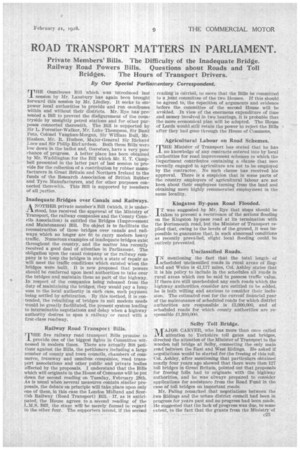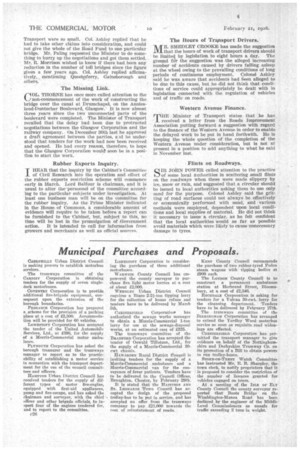ROAD TRANSPORT MATTERS IN PARLIAMENT.
Page 47

Page 48

If you've noticed an error in this article please click here to report it so we can fix it.
Private Members' Bills. The Difficulty of the Inadequate Bridge. Railway Road Powers Bills. Questions about Roads and Toll Bridges. The Hours of Transport Drivers.
By Our Special Parliamentary Correspondent.
THE Omnibuses Bill which waa introduced last session by Mr. Lansbury has again been brought forward this session by Mr. Lindley. It seeks to empower local authorities to provide and run omnibuses within and without their districts. Mr. Rye has pre-seated a Bill to prevent the disfigurement of the countryside by unsightly petrol stations and for other purposes connected therewith. The Bill is supported by Sir L. Forester-Walker, Mr. Luke Thompson, Sir Basil Peto, Colonel Vaughan-Morgan, Sir William Bull, Mr. Haslam, Mr. R. Hudson, Major-General Sir Richard Luce and Sir Philip Richardson. Both these Bills were low down in the ballot and, therefore, have a very poor chance of progress. A better place has been obtained by Mr. Waddington for the Bill which Mr. E. T. Campbell presented in the latter part of last session to provide for the collection of a contribution by rubber manufacturers in Great Britain and Northern Ireland to the funds of the Research Association of British Rubber and Tyre Manufacturers, and for other purposes connected therewith. This Bill is supported by members of all parties.
Inadequate Bridges over Canals and Railways.
A NOTHER private member's Bill (which, it is under1-t stood, has received theapproval of the Ministry of 'Transport, the railway companies and the County Coincils Association) is entitled the Bridges (Improvement and Maintenance) Bill. Its object is to facilitate the reconstruction of those bridges over canals and railways which no longer are fit to carry modern heavy traffic. Numerous examples of inadequate bridges exist throughout the country, and the matter has recently received a good deal of attention in Parliament. The obligation upon the canal company or the railway company is to keep the bridges in such a state of repair as will meet the traffic conditions which existed when the bridges were built. It is now proposed that powers should be conferred upon local authorities to take over the bridges and maintain them as part of the highway. In respect of the companies being released from the duty of .maintaining the bridges, they would pay a lump sum to the local authority in each case, such payment being settled by arbitration. By this Method, it is contended; the rebuilding of bridges to suit modern needs would be greatly facilitated, the present system leading to interminable negotiations and delay when a highway authority desires to span a railway or canal with a first-class roadway.
Railway Road Transport Bills.
rp HE five railway road transport Bills promise to 1 provide one of the biggest fights in Committee witnessed in modern times. There are actually 368 petitions against the Bills, the petitioners including a large number of county and town councils, chambers of coni merce, tramway and omnibus companies, road transport associations and other public and private bodies affected by the proposals. I uuderstand that the Bills which will originate in the House of Commons will be put down for second reading on Tuesday,. February 28th. As is usual when several pleasures contain similar proposals, the debate on principle will take place Upon only one of them, in this case the London Midland and Scottish Railway (Road Transport) Bill. If, as is anticipated, the House agrees to a second reading of the L.M.S. Bill, the stage will be merely formal in regard to the other four. The supporters intend, if the second reading.is carried, to move that the Bills be committed to a joint committee of the two Houses. • If this should be agreed to, the repetition of arguments and evidence before the committee of the second House will be avoided. In view of the enormous expenditure of time and money involved in two hearings, it is probable that the more economical plan will be adopted. The House of Lords would still retain the power to reject the Bills after they had gone through the House of Commons.
Agricultural Labour on Road Schemes.
ITIHE Minister of Transport has stated that he has
no knowledge of any contracts entered into by local .authorities for road improvement schemes to which the Department contributes containing a clause that men recently engaged in agriculture are not to be employed by the contractor. No such clause has received his approval. There is a suspicion that in some parts of the country employers of agricultural labour are not keen about their employees turning from the land and obtaining more highly remunerated employment in the same locality.
Kingston By-pass Road Flooded.
IT was suggested by Mr. Rye that steps should be taken to prevent a recurrence of the serious flooding on the Kingston by-pass road at its termination with the Portsmouth road, but the Minister of Transport replied that, owing to the levels of the ground, it was hinpossible to guarantee that, in such abnormal conditions as recently prevailed, slight local flooding could be entirely prevented.
Unclassified Roads.
IN mentioning the fact that the total length of scheduled unclassified roads in rural areas of England and Wales is 41,177 miles, Col. Ashley states that it is his policy to include in the schedules all roads in rural areas which can be said to possess traffic 'value. If there are still unscheduled any such roads which the highway authorities consider are entitled to be added, he is both willing and anxious to consider their inclusion. The estimated cost for the currenf financial year of the maintenance of scheduled roads for which district authorities are responsible is 15,000,000, and of scheduled roads for which county authorities are responsible £1,380,000.
Selby Toll Bridge.
MAJOR CARVER, who has more than once called attention to 'Yorkshire toll gates and bridges, directed the attention of the Minister of Transport to the wooden toll bridge at Selby, connecting the only main road between the East and West Ridings. He asked if negotiations would be started for the freeing of this toll. Col. Ashley, after mentioning that partieulars obtained nearly four years ago showed that there were then 127 toll bridges in Great Britain, pointed out that proposals for freeing tolls had to originate with the highway authorities, and he was always prepared to consider applications for assistance from the Road Fund in the case of toll bridges on important roads.
Mr. Paling remarked that negotiations between the two Ridings and the urban district council had been in progress for years past and no progress had been made. He suggested that the lack of progress was due, to some extent, to the fact that the grants from the Ministry-of
• c25 Transport were so small. Col. Ashley replied that he had to take other claims into consideration, and could • not give the whole of the Road Fund to one particular bridge. Mr. Paling requested the Minister to do something to hurry up the negotiations and get them settled. Mr. R. Morrison wished to know if there had been any reduction in the number of toll bridges since the figure given a few years ago. Col. Ashley replied affirmatively, mentioning Queensferry, Gainsborough and others. •
The Missing Link.
CIOL. THORNE has once more called attention to the
non-commencement of the work of constructing the bridge over the canal at Drumchapel, on the Anniesland-Duntocher Boulevard, Glasgow. It is now almost three years since the two unconnected parts of the boulevard were completed. The Minister of Transport recalled that the delay had been due to protracted negotiations between the Glasgow Corporation and the railway company. On December 30th last he approved a draft agreement between the parties, ad he understood that tenders for the workhad now been received and opened. He had every reason, therefore, to hope that the Glasgow Corporation would soon be in a position to start the work.
Rubber Exports Inquiry.
T HEAR that the inquiry by the Cabinet's Committee I of Civil Research into the operation and effect of . the rubber exports restriction scheme will commence early in March. Lord Balfour is chairman, and it is usual to alter the personnel of the committee according to the particular subjects under investigation. At least one business man will he on the committee for the rubber inquiry. As the Prime Minister indicated in the House of Commons, a considerable amount of evidence will require to be taken before a report can be furnished to the Cabinet, but, subject to this, no time will be lost in the promulgation of Government action. It is intended to call for information from growers and merchants as well as official sources. The Hours of Transport Drivers.
MR. SMEDLEY CROOKE has made the suggestion that the hours of work of transport drivers should be limited by legislation to eight hours a day. The ground for the suggestion was the alleged increasing number of accidents caused by drivers falling asleep at the wheel owing to the prevailing conditions of long periods of continuous employment. Colonel Ashley said he was aware that accidents had been alleged to be due to this cause, but he did not think that conditions of service could appropriately be dealt with in legislation connected with the regulation of vehicles and of traffic on roads.
Western Avenue Finance.
HE Minister of Transport states that he has received a letter from the Roads Improvement Association putting forward a suggestion with regard to the finance of the Western Avenue in order to enable the delayed work to be put in hand forthwith. He is keeping the whole question of the completion of the Western Avenue under consideration, but is not at present in a position to add anything to what he said in November last.
Flints oft Roadways.
SIR JOHN POWER called attention to the practice of some local authorities in scattering small flints on the roadways when these were made slippery by ice, snow or rain, and suggested that a circular should be issued to local authorities asking them to use only sand for the purpose. Colonel Ashley said the gritting of road surfaces could not always be effectively or economically performed with sand, and various methods were employed, dependent upon local conditions and local supplies of material. He did not think it necessary to issue a circular, as he felt confident that the local authorities would so far as possible avoid materials which were likely to cause unnecessary damage to tyres.












































































































